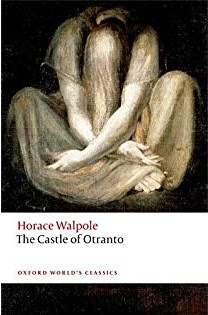The Castle of Otranto and The Tyranny of Man
The Castle of Otranto is the first (and perhaps most bizarre) Gothic horror novel there is. The dialogue is frantic and hard to distinguish from one speaker to the next, the ghost rarely makes a proper appearance and seems to be only a small danger for most of the plot, identities are repeatedly mistaken, and no one is happy by the end. Perhaps the most troublesome thing in this whole story, however, is that the patriarchal system causes as much destruction as treachery that upset the system in the first place.
Manfred, the ruler of Otranto and main antagonist of the story. While it is widely debated whether Manfred should be held responsible for the usurpation of the throne by his grandfather, he nonetheless becomes responsible for all kinds of tyranny when his sole focus becomes the continuation of his lineage for the sake of maintaining said throne. Seeing as there was no legitimate ruler known to the people, Manfred saw the end of his line as both the failure of his grandfather's mission and a potential source of chaos in Otranto as numerous claimants would arise hoping to take over the principality. His greatest fear has always been losing his son, since Conrad was sickly and weak. So when Manfred's only son, Conrad, is killed by a mysterious giant helmet falling from the sky, Manfred becomes a tyrant in search of a new heir. Unfortunately for the women in this story, the importance of patriarchal inheritance ruins all of their lives.
Isabella, betrothed to Conrad, suddenly finds herself the target of Manfred's desires. Instead of being comforted by her soon-to-be family, Isabella is instead chased around by her future father-in-law, who sees her as the best chance of carrying on his bloodline (since that was going to be her role anyways). He declares his previous marriage to Hippolita illegitimate, thereby simultaneously abandoning his loyal wife and daughter simply because they are not "useful" to him any longer. And yet, we later find him negotiating with Isabella's father to exchange their daughters in marriage. In the end, his disregard for these women leaves them utterly ruined. Hippolita, a grieving mother, does everything she can to please her husband, giving up her own happiness and convictions, eventually being resigned to a life of solitude in the church. Matilda, his daughter, is forgotten by her father as though she had died with her brother, and then her blindly jealous father kills her in a case of mistaken identity. Isabella, having lost her fiancé, also loses her best friend and then marries a man she does not love simply because he shares her sorrows.
While readers are able to see the women as more developed characters (though somewhat 2D), the men in the story -- particularly Manfred -- see them as nothing more than tools and bargaining chips to be used for securing one's place in the patriarchal system. It is sad that the loss of his son drives him to such desperation, but this story profoundly highlights the problems with patriarchy, whether Horace Walpole intended it to do so or not.


Comments
Post a Comment